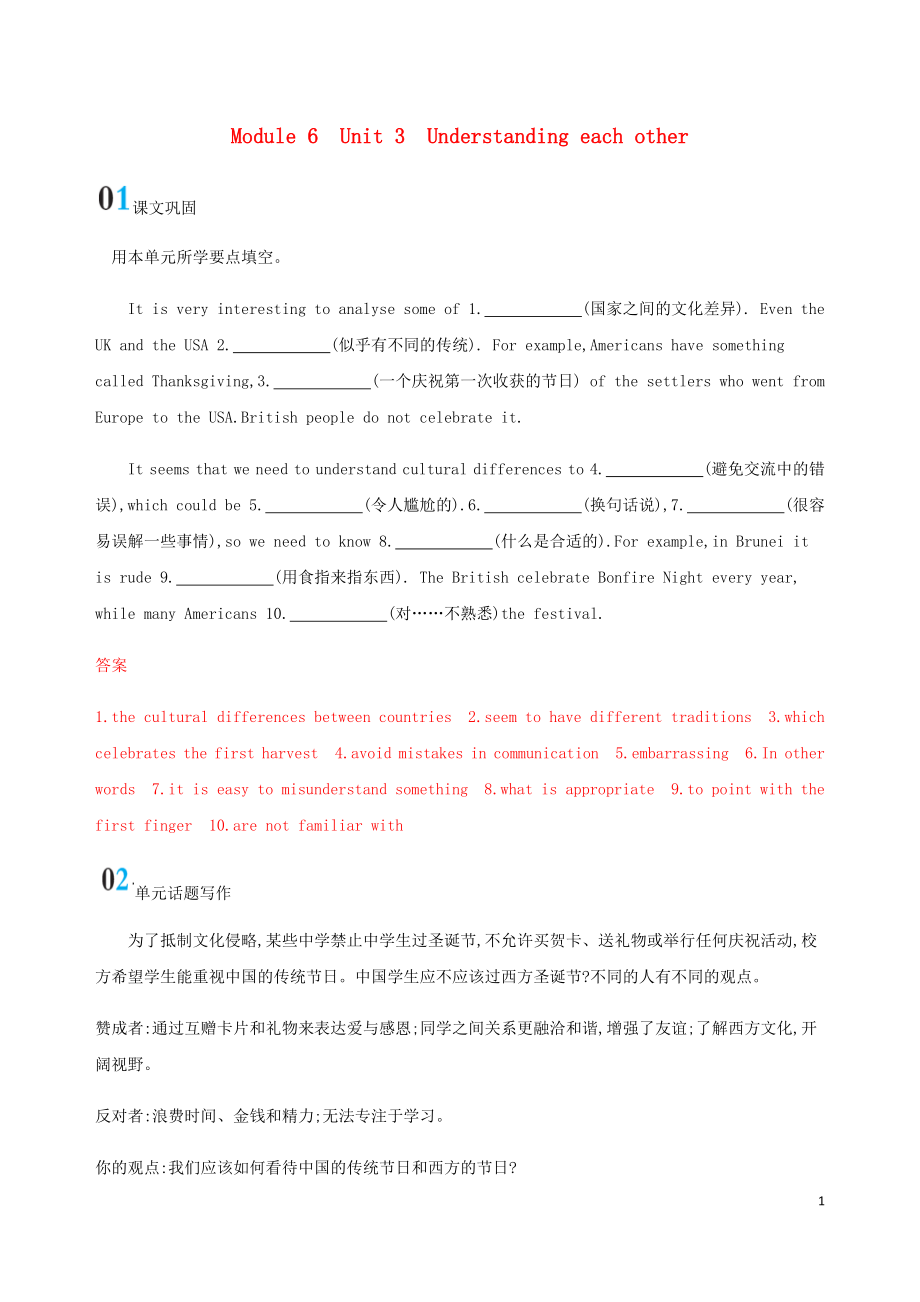《(江蘇專用)2020版高考英語總復(fù)習(xí) Module 6 Unit 3 Understanding each other單元提升》由會員分享�����,可在線閱讀�����,更多相關(guān)《(江蘇專用)2020版高考英語總復(fù)習(xí) Module 6 Unit 3 Understanding each other單元提升(7頁珍藏版)》請在裝配圖網(wǎng)上搜索�。
1、Module 6 Unit 3 Understanding each other
課文鞏固
用本單元所學(xué)要點填空���。
It is very interesting to analyse some of 1. (國家之間的文化差異). Even the UK and the USA 2. (似乎有不同的傳統(tǒng)). For example,Americans have something called Thanksgiving,3. (一個慶祝第一次收獲的節(jié)日) of the settlers who went from Europe to the USA.Bri
2���、tish people do not celebrate it.?
It seems that we need to understand cultural differences to 4. (避免交流中的錯誤),which could be 5. (令人尷尬的).6. (換句話說),7. (很容易誤解一些事情),so we need to know 8. (什么是合適的).For example,in Brunei it is rude 9. (用食指來指東西). The British celebrate Bonfire Ni
3、ght every year, while many Americans 10. (對……不熟悉)the festival.?
答案
1.the cultural differences between countries 2.seem to have different traditions 3.which celebrates the first harvest 4.avoid mistakes in communication 5.embarrassing 6.In other words 7.it is easy to misunderstand something 8
4��、.what is appropriate 9.to point with the first finger 10.are not familiar with
單元話題寫作
為了抵制文化侵略,某些中學(xué)禁止中學(xué)生過圣誕節(jié),不允許買賀卡��、送禮物或舉行任何慶?�;顒?校方希望學(xué)生能重視中國的傳統(tǒng)節(jié)日�����。中國學(xué)生應(yīng)不應(yīng)該過西方圣誕節(jié)?不同的人有不同的觀點�。
贊成者:通過互贈卡片和禮物來表達愛與感恩;同學(xué)之間關(guān)系更融洽和諧,增強了友誼;了解西方文化,開闊視野。
反對者:浪費時間�、金錢和精力;無法專注于學(xué)習(xí)。
你的觀點:我們應(yīng)該如何看待中國的傳統(tǒng)節(jié)日和西方的節(jié)日?
注意:詞數(shù)150左右��。
要求:書
5�����、寫清楚,語言規(guī)范,篇章連貫��。
[寫作導(dǎo)寫]
1.確定文體和表達的口吻
這是一篇關(guān)于中國學(xué)生應(yīng)不應(yīng)該過西方圣誕節(jié)的議論文�����。表達時要以第三人稱和第一人稱為主�。
2.統(tǒng)籌時態(tài)
這是一篇說明看法的文章,所以全文中心時態(tài)為現(xiàn)在時態(tài)。
3.推敲要點表達方法
(1)表達贊成或反對西方圣誕節(jié)該不該慶祝時,可以借鑒以下句子:
①Some people are in favor of celebrating Christmas, arguing that it is just a merry holiday when people get together and have fun with
6�����、each other.
②More importantly, this is a good chance for us Chinese to expose ourselves to foreign cultures, which helps broaden our horizons.
③Other people have the opposite view, thinking it necessary to forbid students from celebrating Christmas.
④On a personal note, traditional Chinese festiv
7�����、als should never be replaced by Western ones.
⑤Therefore, I advocate that we should know more about the significance of the traditional festivals and make it a law to celebrate them.
(2)可能用到的詞匯:
①強調(diào)……的重要性 ?
②贊同,支持 ?
③表達對……的感激之情 ?
④有利于和諧氛圍 ?
⑤使我們體驗外國文化 ?
4.確定要點表達順序和段落結(jié)構(gòu)
本
8、文可以分為四段�。
第一段,學(xué)校為了重視中國傳統(tǒng)節(jié)日禁止學(xué)生過圣誕節(jié)。(With the growing popularity of Christmas celebrations...)
第二段,贊成慶祝圣誕節(jié)的理由�����。(Some people are in favor of celebrating Christmas, arguing...)
第三段,反對慶祝圣誕節(jié)的理由���。(Other people have the opposite view, thinking...)
第四段,自己的觀點��。(On a personal note, traditional Chinese festiva
9�����、ls should never be replaced...)
5.范文填空
With the growing popularity of Christmas celebrations among young people in China, some schools have banned Christmas celebrations to stress the importance of traditional Chinese festivals.
Some people are(1) (同意慶祝圣誕節(jié)), arguing that it is just a merry h
10�、oliday when people get together and(2) (彼此玩得開心). We can express our love and gratitude to our beloved ones by sending cards or gifts with best wishes. Meanwhile, (3) (交換小的禮物)can contribute to a harmonious atmosphere as well as strengthen our friendships. More importantly, this is a good ch
11���、ance for us Chinese to expose ourselves to foreign cultures, which(4) (有助于開闊視野).?
Other people have the opposite view, thinking it necessary to forbid students from celebrating Christmas. For one thing, many classmates around me devote lots of time, money and energies to planning for it and ch
12�、oosing gifts. For another, it prevents us (5) (無法專注于學(xué)習(xí)) studies.?
On a personal note, traditional Chinese festivals should never (6) (被……取代)Western ones. traditional Chinese festivals are a gift from the past and we should stick to the culture of our nation. If we forget the origin, we (7
13�����、) (必定會) lose our root. Therefore, I advocate that we should know more about the significance of the traditional festivals and make it a law to celebrate them.?
答案
3.(2)①stress the importance of?����、趇n favor of?、踖xpress gratitude to ④contribute to a harmonious atmosphere?�、輊xpose ourselves to for
14�、eign cultures
5.(1)in favor of celebrating Christmas (2)have fun with each other (3)exchanging small gifts (4)helps broaden our horizons (5)from focusing on (6)be replaced by (7)are bound to
教師備用 話題微寫作
根據(jù)下面的素材,用本單元所學(xué)詞匯和句式結(jié)構(gòu)翻譯下列句子。
1.正如諺語所說:入鄉(xiāng)隨俗�。
As the saying goes:When in Rome,do as the Rom
15、ans do.
2.出國時,一定要熟悉當(dāng)?shù)匚幕?
When you go abroad,you must be familiar with the local culture.
3.一些人在熟悉中國人和西方人的飲食習(xí)慣上有困難�。
Some people have trouble in getting familiar with Chinese and Western eating habits.
4.中國人習(xí)慣于大家共吃一桌菜。
Chinese are accustomed to sharing all the dishes together.
5.西方人則習(xí)慣每個人吃自己餐盤里
16���、的食物�����。
Westerners adjust to having their plate of food alone.
6.可能他們打招呼的方式是擁抱而不是握手���。
Perhaps they greet you by hugging instead of shaking hands.
7.尤其是你參加一些慶祝儀式時,即使你覺得一些風(fēng)俗很奇怪,但牢記你認為正常的事情在別人看來可能一樣奇怪。
Especially when you attend some celebrations,even if some customs might seem strange to you,remember
17�����、 that what you consider normal probably seems just as strange to others.
【聯(lián)句成篇】把以上句子聯(lián)成短文,要求銜接連貫、過渡自然��。
【參考范文】
As the saying goes:When in Rome,do as the Romans do.When you go abroad,you must be familiar with the local culture. Some people have trouble in getting familiar with Chinese and Western ea
18��、ting habits. Chinese are accustomed to sharing all the dishes together. While westerners adjust to having their plate of food alone. Perhaps they greet you by hugging instead of shaking hands. Especially when you attend some celebrations,even if some customs might seem strange to you,remember that w
19��、hat you consider normal probably seems just as strange to others.
單元詞匯拓展速記
1.以“a-”開頭的形容詞薈萃
①alike adj.相似的
②ashamed adj.感到羞恥的
③asleep adj.睡著的
④awake adj.醒著的;清醒的
2.以“-al”結(jié)尾的形容詞集合
①digital adj.數(shù)碼的
②electrical adj.電的;與電有關(guān)的
③physical adj.身體的
④mental adj.精神的
⑤musical adj.音樂的,配樂的
3.“be+a
20�����、dj.+with”高頻短語
①be familiar with 對……熟悉
②be satisfied with 對……滿意
③be mad with 對……生氣
④be bored with 厭煩……
⑤be busy with 忙于……
⑥be popular with 受……歡迎
⑦be angry with 對……發(fā)怒
⑧be strict with 對……要求嚴格
⑨be patient with 對……有耐心
⑩be content with 對……滿意
4.與“all”相關(guān)的短語
①after all 畢竟,終究
②in all 總共,合計
③all in all 總的來說,總而言之
④at all 根本(不);完全(不)
⑤above all 首先,最重要的
7
 (江蘇專用)2020版高考英語總復(fù)習(xí) Module 6 Unit 3 Understanding each other單元提升
(江蘇專用)2020版高考英語總復(fù)習(xí) Module 6 Unit 3 Understanding each other單元提升

